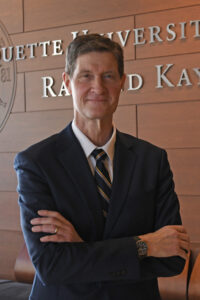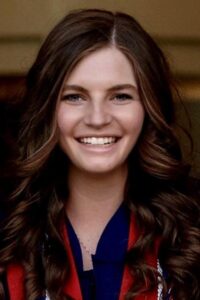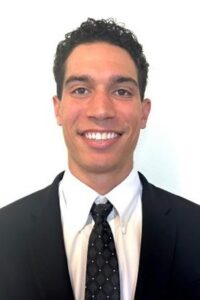Senior Lecturer John Chisholm Introduces Himself
 I first entered public service in 1986 when I was a senior at Marquette University. After concluding (rashly, my physician father no doubt believed) that medical school was not my next step in life, I walked down to the Reuss Federal Building and enlisted in the United States Army. It was one of many inflection points in my life, and there is for me a sense of symmetry that I am returning to private life at Marquette University. Transitions are an opportunity for reflection, growth, and challenge. Ideally, the process is unified by a core identity rooted and formed by past and present connections to family, friends, colleagues, and community—and driven forward by meaningful purpose.
I first entered public service in 1986 when I was a senior at Marquette University. After concluding (rashly, my physician father no doubt believed) that medical school was not my next step in life, I walked down to the Reuss Federal Building and enlisted in the United States Army. It was one of many inflection points in my life, and there is for me a sense of symmetry that I am returning to private life at Marquette University. Transitions are an opportunity for reflection, growth, and challenge. Ideally, the process is unified by a core identity rooted and formed by past and present connections to family, friends, colleagues, and community—and driven forward by meaningful purpose.
I am now the former Milwaukee County District Attorney, an identity and title I share with only one other living person—E. Michael McCann, the man who welcomed me as a prosecutor over 30 years ago. My roots in the community are deep. I was born at St Joseph’s Hospital, the same place my parents met. Dad was a Marquette medical student and mom was a Marquette nursing student. I attended Marquette High, as did three brothers, and graduated from Marquette University, joining a brother and sister who preceded me. I sadly missed the distinction of being “3M” (MUHS, MU, and MULS)—the allure of in-state tuition combined with the GI Bill proved irresistible, and I graduated from UW Law School in 1994.
I served as a line prosecutor then Team Captain in the DA’s Office from 1994 until the end of 2006, when I was elected to office, serving as the Milwaukee County DA from 2007 until January 5, 2025. Which brings me to the really important point—my excitement and gratitude for being welcomed into the Marquette Law School community by Dean Kearney.
I first introduced myself to the dean in 2006 when I was running for election—a true political novice. We had an excellent discussion in his office at Sensenbrenner Hall—prefaced by the clear understanding that he did not endorse candidates. What he did do was much more practical and useful—he introduced me to “Bob the Barber,” who plied his trade in the basement of Straz Hall. For the first-time candidate, Bob was connection gold. He knew just about everyone in the city, at least everyone who had a Marquette connection.
On the surface, the relationship between the Milwaukee District Attorney’s Office and Marquette Law School is self-evident. If you regard the DA’s office as a law firm, then it is one of the largest firms in the state (averaging 125–135 attorneys and 170 support staff), and it has a long and distinguished lineage of attorneys who graduated from MULS and entered the DA’s Office as a first career choice. For many this resulted in lifelong service to the office and community. Others matriculated to equally important jobs and careers in all branches of the public sector as well as distinguished careers in private law firms and academia.
What might not be as obvious is how influential Dean Kearney’s and the Marquette law faculty’s commitment to convening nationally respected criminal justice thought leaders at the Law School has been on the development of policy within the DA’s Office and the Milwaukee County justice system. That influence began almost immediately in 2008, when the Law School started planning for the 2009 Public Service Conference focusing on the future of community justice.
The keynote speaker was Jeremy Travis, president of John Jay College of Criminal Justice in New York City. His remarks on “The Tyranny of the Funnel”—how society’s default response of classifying people with mental health, addiction, and behavior problems as criminals created profoundly harmful structures and results—had a profound impact on the thinking of the then-nascent Milwaukee County Community Justice Council as we endeavored to remake the front end of our criminal justice system. What is now taken for granted as our “early intervention program” was heavily influenced by this moment. The remarks also formed the foundation for the 2014 National Academies report, The Growth of Incarceration in the United States: Exploring Causes and Consequences, that Travis chaired.
The following years brought other renowned speakers and seminars to address an array of issues critical to our efforts to understand and improve the quality of our criminal justice system. These led to lasting friendships and relationships, which often resulted in substantial resources coming to our community as we modeled how practitioners could work with and learn from academic partnerships. The Law School hosted conferences on improving the juvenile justice system, explaining the Community Justice Council, and allowing practitioners, students, and the community to hear from renowned thought leaders such as Robert Weisberg, Robert Sampson, Rachel Barkow, Bruce Western, Patrick Sharkey, Paul Butler, and many more. Each had an influence in furthering my personal education about this complex world that we oversimply reduce to describing as the criminal justice system.
One lasting example that influences the Marquette community today is the Near West Side Partnership. Nurtured by Marquette University and advanced by collaborators whose connections often formed in the Law School, NWSP has become a national model for private/public partnership. The partnership focuses the resources of business, law enforcement, and the university to leverage greater safety, health, and prosperity for the people and neighborhoods surrounding Marquette University. It embodies my strong belief that prosecutors should be principled problem solvers in addition to skilled criminal litigators.
I opened by saying that I hoped my transition from public service to serving the Marquette Law School community would be driven forward by purpose. I have practiced criminal law for 30 years. Much of that time was spent leading fellow public servants whose charge was to maintain the social compact with integrity and fairness. I think I’ve learned a thing or two, but the thing I’ve learned most is to value learning more deeply and to approach the intersection of law and its application to society with humility and a predisposition for constructive collaboration. I hope to share my experiences, particularly with this next generation of servants of the law, but also with the broader legal community and always with my fellow citizens in mind.
I envision a good deal of work in my new position as senior lecturer at Marquette University Law School. Focusing here only on this blog, I anticipate writing about a variety of issues, including some reflective of my growth as a prosecutor and as a system leader. Yet I hope not to be merely retrospective: I approach this work with the express intent of helping kindle in a new generation the fire to serve the nation as thoughtful, courageous, and committed legal servants.
I have been privileged throughout my life by being given the opportunity to serve others. I hope to continue that work here at Marquette University Law School.

 By Morgan Millar, 2L
By Morgan Millar, 2L By Evan Williams, 2L
By Evan Williams, 2L By Sydney Gang, 2L
By Sydney Gang, 2L